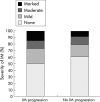Factors predicting progression of gastric intestinal metaplasia: results of a randomised trial on Helicobacter pylori eradication
- PMID: 15306578
- PMCID: PMC1774213
- DOI: 10.1136/gut.2003.034629
Factors predicting progression of gastric intestinal metaplasia: results of a randomised trial on Helicobacter pylori eradication
Abstract
Background and aims: Gastric intestinal metaplasia (IM) is generally considered to be a precancerous lesion in the gastric carcinogenesis cascade. This study identified the risk factors associated with progression of IM in a randomised control study.
Subjects and methods: A total of 587 Helicobacter pylori infected subjects were randomised to receive a one week course of anti-Helicobacter therapy (omeprazole, amoxicillin, and clarithromycin (OAC)) or placebo. Subjects underwent endoscopy with biopsy at baseline and at five years. Severity of IM was graded according to the updated Sydney classification and progression was defined as worsening of IM scores at five years in either the antrum or corpus, or development of neoplasia. Backward stepwise multiple logistic regression was used to identify independent risk factors associated with IM progression.
Results: Of 435 subjects (220 in the OAC and 215 in the placebo group) available for analysis, 10 developed gastric cancer and three had dysplasia. Overall progression of IM was noted in 52.9% of subjects. Univariate analysis showed that persistent H pylori infection, age >45 years, male subjects, alcohol use, and drinking water from a well were significantly associated with IM progression. Duodenal ulcer and OAC treatment were associated with a reduced risk of histological progression. Progression of IM was more frequent in those with more extensive and more severe IM at baseline. With multiple logistic regression, duodenal ulcer (odds ratio (OR) 0.23 (95% confidence interval (CI) 0.09-0.58)) was found to be an independent protective factor against IM progression. Conversely, persistent H pylori infection (OR 2.13 (95% CI 1.41-3.24)), age >45 years (OR 1.92 (95% CI 1.18-3.11)), alcohol use (OR 1.67 (95% CI 1.07-2.62)), and drinking water from a well (OR 1.74 (95% CI 1.13-2.67)) were independent risk factors associated with IM progression.
Conclusion: Eradication of H pylori is protective against progression of premalignant gastric lesions.
Figures




Comment in
-
Is gastric cancer preventable?Gut. 2004 Sep;53(9):1217-9. doi: 10.1136/gut.2004.039834. Gut. 2004. PMID: 15306570 Free PMC article. Review.
References
-
- Correa P . Human gastric carcinogenesis: a multistep and multifactorial process. First American Cancer Society Award Lecture on Cancer Epidemiology and Prevention. Cancer Res 1992;52:6735–40. - PubMed
-
- Huang JQ, Sridhar S, Chen Y, et al. Meta-analysis of the relationship between Helicobacter pylori seropositivity and gastric cancer. Gastroenterol 1998;114:1169–79. - PubMed
-
- Uemura N , Okamoto S, Yamamoto S, et al. Helicobacter pylori infection and the development of gastric cancer. N Engl J Med 2001;345:784–9. - PubMed
-
- Uemura N , Mukai T, Okamoto S, et al. Effect of Helicobacter pylori eradication on subsequent development of cancer after endoscopic resection of early gastric cancer. Cancer Epidemiol Biomarkers Prev 1997;6:639–42. - PubMed
Publication types
MeSH terms
Substances
LinkOut - more resources
Full Text Sources
Other Literature Sources
Medical
